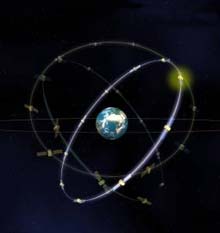Galileo gets the go-ahead

Europe’s satellite navigation system, called Galileo, is planned to become operational in 2008 <br>® ESA
The European Space Agency warmly welcomes the decision taken today by the European Union Transport Ministers, meeting in Brussels.
Galileo has now been given the official go-ahead but for ESA that simply means that work on Galileo can continue! ESA teams have already been working for a number of years on satellite navigation systems, including the development of critical technologies such as atomic clocks and signal generators.
Developed by ESA in collaboration with the European Union and co-funded by the two organisations on a 50-50 basis, Galileo is a complete civil system, designed to be operational from 2008 and to provide the world in general and Europeans in particular with an accurate, secure and certified satellite positioning system.
There are many potential applications in road, rail, air and maritime traffic control, synchronisation of data transmission between banks, etc., and the economic implications for the coming 15 years are tremendous, with an estimated 4.6 return on investment and the creation of more than 100 000 jobs.
Satellite navigation undoubtedly represents a real technological revolution comparable, some say, to the invention of the timepiece!
Once, we needed to know the time. Now, we need to know the time and also where we are.
So Galileo will be of vital importance to ordinary men and women both in Europe and throughout the world because at present everything depends on the GPS set up and controlled by the US military. Galileo will be in commercial competition with the GPS but will also complement it and provide redundancy. The result will be a continuity of service that could not be achieved by a single system.
The go-ahead for Galileo is particularly important for European industry, which will now be able to develop the advanced technologies required not only for the purposes of the satellite network and its ground support system but also for the numerous applications associated with it.
ESA was able to start work on applications several years ago, thanks to the European Global Navigation Overlay Service EGNOS, which refines current GPS data and foreshadows the services Galileo will provide.
“Galileo marks an important step for Space Europe”, said ESA Director General Antonio Rodotá, “because it is the first time a project has been conducted jointly by the European Space Agency and the European Union”. It is also the first time the European Union has set up a joint undertaking. The partnership, comprising the European Commission and ESA, will have overall responsibility for the development and validation phase and the preparations for deployment and operations.
It is thus a great step forward for space activities and for Europe, a step that will bring benefits to people all over the world.
The Galileo system will consist of 30 satellites (27 in operation and 3 in reserve), deployed in three circular Medium Earth Orbits at an altitude of 23 616 km and an inclination of 56° to the equator. This will provide excellent coverage of the planet. Two Galileo Control Centres will be set up in Europe to monitor the operation of the satellites and manage the navigation system.
Media Contact
All latest news from the category: Physics and Astronomy
This area deals with the fundamental laws and building blocks of nature and how they interact, the properties and the behavior of matter, and research into space and time and their structures.
innovations-report provides in-depth reports and articles on subjects such as astrophysics, laser technologies, nuclear, quantum, particle and solid-state physics, nanotechnologies, planetary research and findings (Mars, Venus) and developments related to the Hubble Telescope.
Newest articles

First-of-its-kind study uses remote sensing to monitor plastic debris in rivers and lakes
Remote sensing creates a cost-effective solution to monitoring plastic pollution. A first-of-its-kind study from researchers at the University of Minnesota Twin Cities shows how remote sensing can help monitor and…

Laser-based artificial neuron mimics nerve cell functions at lightning speed
With a processing speed a billion times faster than nature, chip-based laser neuron could help advance AI tasks such as pattern recognition and sequence prediction. Researchers have developed a laser-based…

Optimising the processing of plastic waste
Just one look in the yellow bin reveals a colourful jumble of different types of plastic. However, the purer and more uniform plastic waste is, the easier it is to…


